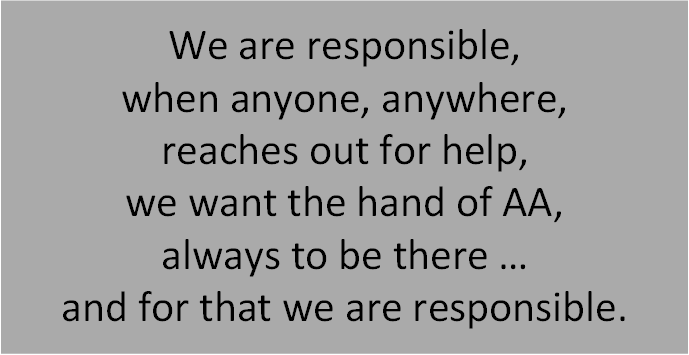A.A. members who work in the field of alcoholism (formerly called two hatters) confront many issues and are beset with many dilemmas not commonly found in other occupations. Professional practices may, at times, seem to conflict with A.A. principles and practices. For example, it may be a treatment facility practice to bus ’chemically-dependent nonalcoholic patents to local A.A. meetings. Should the counselor, knowing A.A.’s singleness of purpose, and that the only qualification for membership is “a desire to stop drinking,” ask to be excused from performing this task? This is only one example of the dilemmas faced by a recovered alcoholic in the field.
When the recovered counselor attends A.A. ’meetings for self, he or she may be faced with other dilemmas. Very often, their fellow A.A.s may not look with favour on a recovered alcoholic who “makes money off other alcoholics” or who may be considered by other A.A.s as the “expert in alcoholism and other life problems.”
The A.A. Guidelines for A.A. Members Employed in the Alcoholism Field points out, moreover, that it is best if A.A.s who work in treatment facilities do not attend or become involved with the A.A. meeting held in the facility.
 In a profession where there is a high degree of burnout it is best if the individual keeps his or her personal program separate from their professional life. Jack C., EAP director for a large corporation, has a personal rule of not holding any group office for as long as he is professionally counseling alcoholics. “I need the meetings to refuel,” Jack says. “I give out all day, and in the evening, when I go to my A.A. meetings I’m like a sponge. I have to soak it all up to fill what has been emptied out.” Jack does not feel uncomfortable or inhibited about sharing if a client is at the same meeting – some counselors, however, find such situations difficult.
In a profession where there is a high degree of burnout it is best if the individual keeps his or her personal program separate from their professional life. Jack C., EAP director for a large corporation, has a personal rule of not holding any group office for as long as he is professionally counseling alcoholics. “I need the meetings to refuel,” Jack says. “I give out all day, and in the evening, when I go to my A.A. meetings I’m like a sponge. I have to soak it all up to fill what has been emptied out.” Jack does not feel uncomfortable or inhibited about sharing if a client is at the same meeting – some counselors, however, find such situations difficult.
Other questions abound: Does the recovered A.A. disclose his or her own alcoholism when counseling patients? If self-disclosure is made, is it always only for the benefit of the client? Does self-disclosure subtly change the nature of the therapeutic relationship and, with self-disclosure, does the professional relationship become a Twelfth Step relationship? All these things, the counselor should consider. It is a difficult task; one that requires knowledge and a great deal of patience.
Jim A., a member of the trustees’ Treatment Facilities Committee and himself a counselor, feels the answers to these and other dilemmas encountered in the field of alcoholism, may lie in the counselor knowing his or her limits. Knowledge of self and job, knowledge of Alcoholics Anonymous, and knowledge of one’s capacity to accomplish an assigned task, can contribute much to easing problems of personal life, occupation, health and recovery. “The key is in knowing which is which and when,” Jim says. Above all, a daily Tenth Step will do wonders in helping the recovered counselor stay on an even keel. “Finding A.A. meetings where the members may not either know or be interested in your occupation is often helpful,” Jim adds. “Keeping personal A.A. and professional practices as separate as possible is sound advice. When occupational demands seem to conflict with A.A. principles, talk it out with other health professionals who may have similar problems. Do it one day at a time!”
It is also helpful to join professional peer organizations, such as counselors associations, that often serve not only as a means of keeping up with the state of the art in alcoholism issues, but also as a safety valve by providing an opportunity to share with others.
Bernie L., A.A. member and director of an EAP program, started the Delaware Two Hatters several years ago. “Around the late 1970s,” Bernie says, “we began to notice that counselors, due to the stress of their jobs, were beginning to drop like flies. They needed someone to talk with; a forum for their common problems.” Members of this group (which include treatment and EAP personnel, workers from family court programs, individual counselors and others) hold monthly dinner meetings where topics discussed include stress, burnout, spirituality, and A.A. principles. Twice a year they have a retreat, to unwind, share together and hold A.A. meetings.
Many A.A.s feel the need to attend more meetings once they begin working in the field; others may cut down and attend fewer. One A.A. member, who is in private practice, feels that, although he doesn’t make as many meetings as he once did, there is a greater need to work on his spirituality.
In conclusion, Jim A. says, “Striking an appropriate balance between occupational demands and A.A. service is every counselor’s goal. Employing the tools of the program and engaging in professional outlets can aid in accomplishing these goals. Using some of these simple practices should aid the counselor in avoiding pitfalls and dilemmas, and enable him or her to be there ’when anyone, anywhere reaches out for help.”
For more information on this subject write to the General Service Office for the service piece A.A. Guidelines for A.A. Members Employed in the Alcoholism Field (free in quantities of ten or less).
Originally published in News and Notes from the General Service Office of A.A. ® Box 459 Vol. 31, No 2 / April-May 1986 www.aa.org



